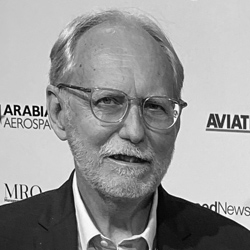Saudi boosts modification alliance
As demand for aircraft modifications and cabin refits builds, the Independent Aircraft Modifier Alliance (IAMA) has expanded its membership and geographical footprint into Saudi Arabia.

Fleet future: Saudia and SAEI plan to convert Boeing 777 passenger aircraft into freighters. Picture: Boeing.
Saudi Arabia’s ambitions to expand its aerospace capabilities have taken an important step forward with Saudia and Saudia Aerospace Engineering Industries (SAEI) joining the international standard-setting IAMA.
In line with the kingdom’s ‘vision 2030’ blueprint for industrial development, SAEI has already announced a “greenfield investment” in a multi-bay facility for wide-body MRO and modifications, notably passenger-to-freighter (P2F) conversions of Boeing 777 airframes from the Saudia fleet, working with Mammoth Freighters.
IAMA said the national carrier and its technical arm bring additional high-profile Middle East and north Africa (MENA) voices to IAMA’s diverse group of stakeholders advocating for modifications completed via supplemental type certifications (STC).
Etihad Engineering was a founding member, and other regional MROs are believed to be weighing up the advantages of access to the alliance’s resources and expertise and its audited mark of quality.
The alliance currently has 12 members, plus 10 airlines, operators and lessors registered as subscribers.
Welcoming the two Saudi Arabian companies, Nina Schulz, IAMA managing director, said the alliance is working to attract stakeholders from across the world “to represent the needs and strengths” of the global aviation modification market.
“You need much more than the STC approval granted by an authority for a successful STC project,” said Schulz. While the approval signifies compliance with airworthiness requirements, IAMA adds “another layer” of considerations to satisfy the needs of operators and owners.
“An IAMA-endorsed STC gives operators and owners confidence in their MRO’s operational excellence.”
Etihad Engineering recently became the first MRO in the Middle East to gain this important IAMA endorsement, for an Airbus A320/A321 passenger cabin reconfiguration carried out under an STC first approved in 2019.
The modifications applicable to A320-232 and A321-231 models include replacing C1/C2 stowages with windscreen partitions, removing two rows of seats and re-pitching as per post-modification layout of passenger accommodation (LOPA).
Saudia’s status as an IAMA subscriber gives the airline access to the alliance’s burgeoning resource library and the IAMA rulebook, which cover an extensive range of topics, including asset preservation, de-modification, ‘right to use’ and the complexities around STCs.
SAEI, as a member, can take advantage of critical educational resources, guidance and expertise. The prime consultancy and fulfilment organisation for Saudia’s modification campaigns, SAEI also commits to complying with the IAMA rulebook – the alliance’s standard.
SAEI serves regional and global clients from a network of more than 50 locations worldwide and is expanding into its state-of-the-art MRO operation at King Abdul-Aziz Airport, near Jeddah, with a design office, among other capabilities.
Abdulhamid N Aldosary, director, APC and engineering support at SAEI, said: “IAMA’s founding members are highly regarded in the aviation modification market. Our vision is to be the partner of choice and a catalyst for aviation’s success in Saudi Arabia and globally.
“We are thrilled to join the alliance and contribute lessons learned from our experience and strengthen our operations through IAMA’s collective expertise and the high standards they advocate and defend.”
IAMA was founded three years ago by retrofit market leaders who believe that an independent, transparent market benefits all. The alliance collaborates to develop standards that streamline communications and documentation within approved STC modification projects.
Stay up to date
Subscribe to the free Times Aerospace newsletter and receive the latest content every week. We'll never share your email address.


